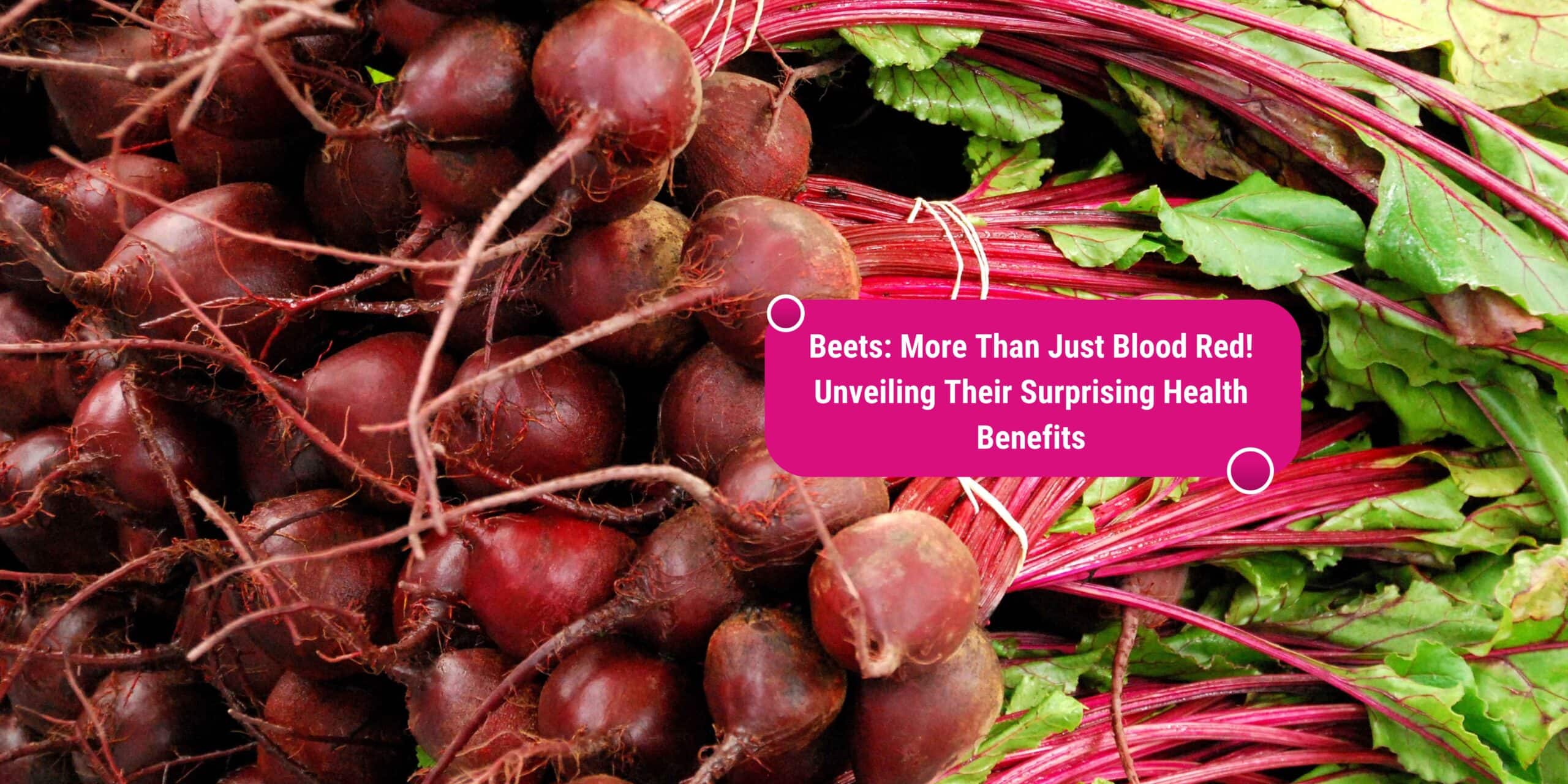The red or purple coloration of beets comes from the betalains, while the yellow coloration is due to the carotenoids. Beets, as well as spinach, are the most frequently consumed vegetables among professional and recreational athletes. Beets not only contain vitamins, minerals, and other biomolecules but are also a source of vegetables that physiologically affect the human body. A variety of bioactive compounds have been shown to help protect against multiple cancer types, diabetes, blood pressure, and anemia, while also enhancing exercise performance and inflammation. In combination with their functionality, molecular compounds, and higher yielding content, beets indeed have a bright future.
A food item often taken for granted is the versatile and health-loaded beet (or beetroot) (Beta vulgaris L.), a tuber crop that has a variety of beneficial effects when consumed in the diet. Despite its historical use and consumption, beets, salad types in particular, have experienced an increasing revival in modern times due to the increased desire and demand from consumers for vegetables rich in antioxidants and functional ingredients. This is because beets, depending on the pigmentation, are a valuable source of bioactive secondary plant substances.
Nutritional Profile of Beets
When determining the exact nutrient content of beets and beet greens, we should recognize that many Vitamins & Minerals Database entries from the USDA are based on raw beet greens and raw beets. However, it is the water content that tends to vary the most between raw, cooked, and canned vegetables and fruits – not the overall concentration of vitamins and minerals.
The beet greens, sometimes called beet tops, are also consumed as a vegetable and have a slightly bitter sting in their flavor. Beets are a unique source of phytonutrients called betalains. The most well-studied betalain is beet red betacyanin, but betalains include goanins, betaxanthins, and several other pigmented compounds. Pigment doesn’t sound very exciting until we remember that it is pigments that provide many of our plant foods with their unique health properties. A small number of plant foods are typically placed into the category of being better off when cooked, and beets are most definitely one of these nutrient-packed vegetables. Since some of the unique phytonutrients in beets are better released when the beet is either steamed or roasted, these are probably the most delicious options to bake beets.
The lowly beet (Beta vulgaris) is emerging as a dynamic nutritional powerhouse. Beets have a very distinctive taste, with their robust red color providing a brilliant visual contrast to the foods we eat. Whether eaten on their own, juiced, cooked, or pickled, beets (also known as beetroots) have been embraced by numerous cuisines for their deep, earthy flavor.
Health Benefits of Beets
Nutrients in beets have been shown to support overall brain health. Beets contain compounds that dilate blood vessels, increase blood flow and oxygen to the brain, and have been shown to enhance cognitive function. Phytonutrients in beets can support fat metabolism. Some research has shown that betacyanin, a pigment in beets, can decrease the effects of a high-fat diet and possibly lower cholesterol levels. Additionally, beets have been shown to support normal blood clotting and respiratory health.
Beets are a unique source of phytonutrients called betalains. Betanin and vulgaxanthin, the two best-studied betalains found in beets, have both been shown to provide antioxidant, anti-inflammatory, and detoxification support. Beets are also a great source of dietary fiber and key nutrients such as folate, potassium, vitamin C, and B vitamins. Beets contain high levels of nitrates which are converted to nitric oxide in the body. Nitric oxide can aid in reducing blood vessel inflammation and boosting cardiovascular health. Beets have been shown to support the body’s natural detoxification process, possibly by boosting detoxification enzymes.
Cardiovascular Health
It is also possible that beet juice could enhance the efficiency of our mitochondria in producing energy in cardiorespiratory and skeletal muscle. Sedentary old people who drank beet juice also reached the same level of high-intensity exercise as younger, more active individuals, and with less effort. Although the health benefits of beets are impressive, pregnant and nursing women may need to avoid consuming them too liberally as beets can enrich the level of nitrates in the body. Infants below six months of age can become seriously ill by contracting nitrate poisoning.
Beets contain nitrates, which, through a series of metabolic steps, are reduced to nitrites and nitric oxide. Nitric oxide relaxes and dilates blood vessels, and it also inhibits platelets from becoming too sticky. So it acts within minutes to reduce blood pressure through this dilation. It increases the blood supply to the brain, possibly leading to a better memory, and also reduces the number of heart attacks as it makes blood platelets less sticky and thus less likely to form dangerous clots. When a natural supplement to lower blood pressure using beet juice is taken three hours after its ingestion, both systolic and diastolic blood pressure could be significantly reduced compared to a placebo.
Anti-Inflammatory Properties
In accordance with the study of the anti-inflammatory activity of betanin from fruit of Opuntia elatior Mill. on the rats, it was observed that the efficacy of betanin can be detected as a reduction of blood cytokine levels. Precisely after the initial injection (non-covalent and covalent mixture) and on the 21st day (all three mixtures), blood levels of TNF-α and IL-6 significantly dropped. Authors have also concluded that betanin can be considered as a donor of chemopreventive and immunomodulatory activity. These results have shown a potential role of trackable administered liposomal betanin in treating inflammatory diseases, especially for the treatment of various chronic diseases.
Beets are also known to provide relief from inflammation caused by numerous chronic diseases. Anti-inflammatory properties of beets may be attributed to betaine, a nutrient that protects cells, proteins, and enzymes from environmental stress. Recent studies of heart disease, type 2 diabetes, and other diseases have proven that regular intake of betaine in beetroot can lower chronic inflammation. The powerful anti-inflammatory betalain antioxidants present in beets provide chemo-preventive benefits. Based on these results, preliminary studies show that beetroot can be used to bypass some of the inflammation causes such as obesity, liver disease, and bacterial endotoxins. Such findings are essential, considering that chronic diseases including obesity and type 2 diabetes are caused by chronic inflammation.
Digestive Health
If you don’t have enough fiber, you won’t be regular, leading to extra waste material left over in your colon from the digestive process. This allows bad bacteria to have a flourishing place to grow and release harmful toxins and create inflammation. Once you ingest beets, they help to move that waste out of your colon and keep your colon clean because beets are bulk-forming fiber. The combination of the beet and its fiber means that your intestines absorb water to get bigger and keep your body hydrated (very beneficial). Water in the intestines helps to move food through the intestines and makes it easy to go, preventing constipation and keeping you regular.
Did you know that beets help to circulate the body? Not only does the blood improve once the beet is ingested, but our whole digestive system benefits from its powerful properties. The power of the digestive system not only depends on having good bodily function and speed, but it also relies on having fiber. Beets are high in fiber. This helps to boost your digestive health and cleanse you out every time you eat, instead of letting the bad from the previous meals accumulate – which is even more dangerous for your health.
Brain Health
The benefits of beetroots are credited to their high nitrate content. After consumption, the nitrate compound converts into nitrites to increase the blood flow to the brain and lower blood pressure. Prior to and after a meal, this results in improved cognitive function, increased visual acuity, as well as a higher improvement rate. However, in order to do 100 ml of beet.
The powerful folate content found in beets not only reduces your risk for anemia by aiding red blood cell production, preventing the risk of suffering from cognitive impairments, birth defects, and various other brain disorders, but also helps to maintain the potassium health of the brain and enhance cognition skills, specifically in improving thought processes and general well-being functions and tasks. These can involve thought, judgment, and perception that are used to calculate mathematical, abstract, and scientific problems, and stimulate nerve signal communication throughout the body. As such, consuming beets on a regular basis may help to reduce the instances of cognitive diseases like dementia, stroke, and Alzheimer’s disease.
Incorporating Beets into Your Diet

107. Incorporating Beets into Your Diet Drinking a glass of beet juice or incorporating a handful of boiled beetroot or a beet salad might be acceptable to some individuals. Some are, however, put off by this approach due to the strong taste or the potential for a lack of aesthetic appeal as a result of the dark red color staining associated with the consumption of such meals. Initial chemical changes naturally reduce the ability of betalain pigments to create deeply red color in boiled beet roots. Such changes may explain why the market is dominated by colorless beet juice and not red beet juice. As a result, many customers who wish to obtain the therapeutic advantages of betalains are obliged to resort to beetroot capsules. So, either because of aesthetic concerns or semi-locked pigment availability, many would profit from an alternative source to gain access to betalain antioxidants in order to promote heart health.
101 to 106 – The ESC and JNC 7 guidelines indicate that a diet rich in potassium is an essential aspect of healthy blood pressure management. Given that when betalain is quantified in urine, a significant positive correlation has been found between betalain excretion and the level of NADPH-dependent oxidase expression, in part responsible for mediating the production of reactive oxygen species and contributing to hypertension through the oxidation of neighboring biomolecules, betalains could be utilized to combat cardiac impairments and assist in hypertension management.
Recipes and Cooking Tips
Half of my beets have less-than-desirable flavor: I like only about half of the beets I grow. The last two years, that other half has had undesirable flavors that I cannot quite categorize. They are not strong or musty. Just disappointing. Any ideas?
Don’t just eat the bulb! People usually eat the bulb of the beets, but you should know that the beet roots are perfectly edible, too. They have a nice taste similar to chard (red stem beets). If you’ve got some red stems on your beets, chop them lightly, and then sauté them in olive oil. After a few minutes, add the wilted greens to your favorite dish. They will add vitamins A and K, as well as antioxidants and a lovely crimson color.
What recipes can I make using beets? The beet is a bomb of nutrients, so make sure you get creative and use beets in a variety of recipes. Soups are certainly one way to go. You can use beets in several kinds of vegetable or chicken soups. As a colorful addition to your salad, beets are top-notch. Pair them with arugula, sliced apples, walnuts, and blue cheese, and you have yourself a winner.
Charred beets: For this technique, scrub 4 medium-sized beets and then wrap each one in aluminum foil. Place the whole enchiladas directly over the flame of the stovetop and let them cook until golden brown. This typically takes approximately 15 minutes or so.
Try beets in the microwave. They’ll cook quickly and keep their flavor. Simply wash them, wrap each one in a paper towel and then wrap again in a clean kitchen towel. Place on a microwave-safe dish and cook for about 10 minutes for 4 beets. They’re done when you can slightly pierce the beets with a toothpick or fork.
How do you cook beets?
Potential Side Effects and Precautions
As great as the benefits, it turns out that beetroot does have some potentially damaging features if not taken with care. In this article, several surprising health benefits of beetroot have been outlined. But these contain different information on how consumed beetroot products may affect primarily healthy people, elderly patients, and those taking grapefruit juice supplemented with certain medications. The review also gives some tips on what to do and what not to do if you have moultix and skin inflammation as well as high blood pressure in order to improve quality of life and boost health.
The beetroot, mostly known simply as the beet, is a root vegetable with the scientific name Beta vulgaris. It is commonly consumed by people in salads, cooked and eaten with other veggies, fruits, and meats as well as juiced into a vibrant ruby-red beverage – or dyed alcohol. Besides its well-known field of use in food manufacturing, the beetroot’s popularity has been rising rapidly in the health industry. The beetroot happens to be a superfood, packed with an array of health-giving compounds. As if these weren’t advantageous enough for regular eaters of the beetroot, several health-promoting activities have also been discovered.
In conclusion, beets and their nitrate content offer a lot for cardiovascular health. Nitrate works through its reduction to nitric oxide in the body. This gives a much more efficient way to increase levels of this important signaling molecule, particularly with exercise or other phase II enzyme inducers. However, how efficiently the body can reduce nitrate to nitric oxide is affected by several factors, and researchers continue to learn more about them. Providing nitrate doesn’t mean you can avoid things that increase its conversion to nitric oxide, or that you can ignore it during periods of especially high demand for this vital signaling molecule. The biochemistry of how substances interact is always more complex than it appears at first, but sometimes the surprises are even better than expected!
Beets can offer a lot for your health. By cutting down the oxygen cost of exercise, reducing resting blood pressure and inflammation, increasing nitric oxide levels in the body, boosting activity performance and muscle strength, and offering other health benefits, beets are showing that they’re full of good surprises beyond their deep red color. Giving beets a try is definitely worth it if you’re looking to tame chronic inflammation, keep blood pressure down, and manage the demands of tough workouts, sports, or other high energy activities.



